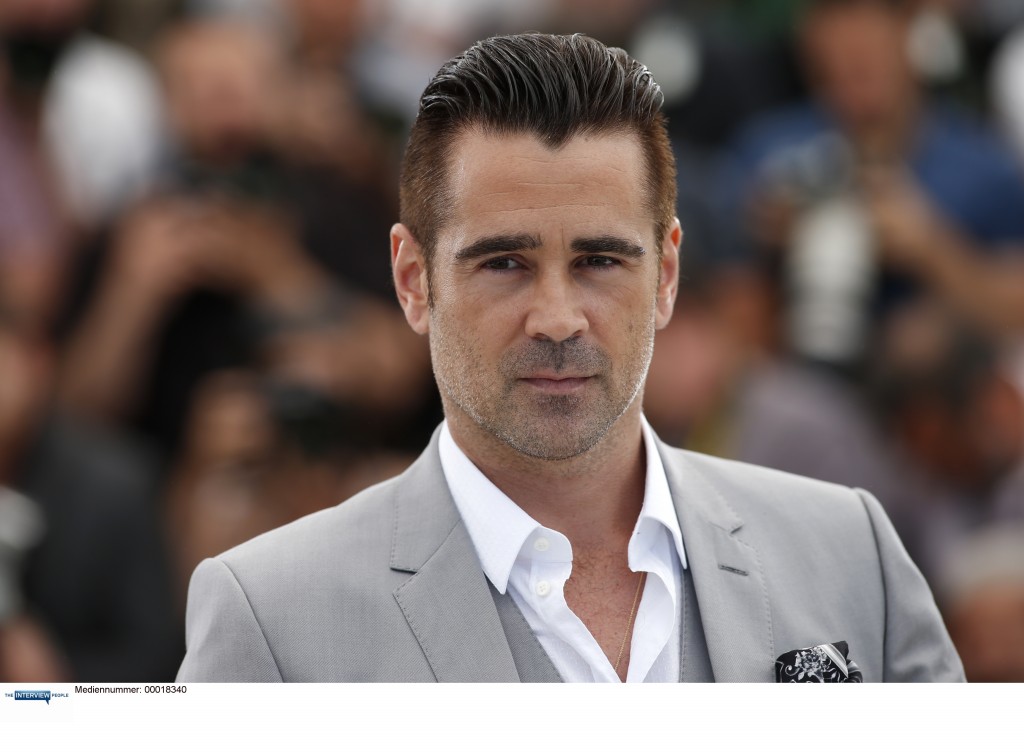
On The Ups & Downs of the Movie Biz, Family, Spare-Time Activities and His Movie The Lobster
By Jan Janssen / The Interview Feed
Question (Q): Colin, The Lobster will prove confusing to many people who see it. What are your thoughts on the story?
Colin Farrell (CF): Don’t ask me to explain the film! (Smiles) I also think the director and the writer (Yorgos Lanthimos) and co-screenwriter (Efthymis Filippou) left the story open to interpretation and didn’t want to hammer home one particular idea or message. That’s what makes his films so compelling and disturbing at the same time. I was left really moved and disoriented when I saw Dogtooth (Lanthimos’s controversial 2009 film) and that’s a big reason that I wanted to be part of The Lobster, because it has that same eerie feeling to it.
Q: Did working on the film help you understand the story better as compared to when you first read the screenplay?
CF: (Laughs) Not really, no. It only deepened my level of confusion. But that’s not necessarily a bad thing. Why should things be spelled out anyways? It’s much more fascinating to see a film like this and try to discover the meaning behind it. Everything about my experience working on the film was very special.
Q: But you must have some impressions of what your characters are going through?
CF: The film is dealing with the nature of loneliness that human beings experience. Being alone is a difficult state to be in at times. There’s also a stigma that comes attached with not being in a relationship. We were exploring the sense of detachment the characters are experiencing in their lives. This strange world they’re living in is obviously a metaphor for a lot of those kinds of feelings we all have from time to time. I can imagine people having incredibly intense debates after they watch this movie and try to provide their own interpretations and figure out what it’s saying about the human condition. For me, it was a deeply moving experience and the kind of thing I thrive on as an actor.
Q: Did the director give you any explanation about the various subtexts that are running through the film?
CF: No. Yorgos wanted to keep us in the dark about the world that he wanted to create. He believes that it’s more effective to let the actors get a taste of the same kind of disorientation and melancholy that our characters are experiencing. And you do have that sense of discomfort that comes from not being able to make sense of things. I think it probably added something to my performance.
Q: You’ve remade your life as well as remaking yourself as an actor in terms of choosing to do smaller, more intense kinds of films…
CF: I’m so lucky to do this job! I’ve always been a great observer of people ever since I was a little kid. I’m very curious about human behavior and what makes us tick. Why we behave the way we do, how we experience life and all of that. Human beings are fascinating and tragic and hilarious creatures. The kinds of films I’m making now are the ones I wanted to do when I first started dreaming about becoming an actor. But I got off to such a fast start in Hollywood and suddenly I was making all these big movies in Hollywood that I never got a chance to do those smaller, intimate films, and the more intense kinds of roles I was interested in playing. Whenever I look at a new project now, I want to see whether it offers me a chance to probe deeply into the human condition and our psychology. That’s what excites me about the work the most.
Q: And the downside of the business?
CF: Well, apart from all the paparazzi and the insane focus on your private life, the most painful thing for me is being away from home and my children. I used to love making one movie after another and moving from one city to another and staying in palatial hotels. You never have to clean your room, you can order room service around the clock, and you feel this freedom that comes from being able to wander around in life. Now I would much rather spend time at home with family and enjoy the kind of comfort that comes with that. I’ve always loved family, and it’s more important to me now than ever. I live for my boys and I want to make their lives as beautiful as possible. That’s what comes with the responsibility you feel as a father. Until you have children, it’s hard to understand what that really means.
Q: You shot The Lobster in Ireland. Are you happy at having the chance to work in your native country?
CF: We shot the film mainly in County Kerry in the southwest of Ireland and that’s the region I feel closest to in the world. The people there are so warm and generous. I was very happy to spend time there, and every few years it seems I’m getting the chance to work and live in Ireland. I wasn’t even looking for a film to shoot there this time — The Lobster came by chance. Even though I live in Los Angeles, there’s nothing better than the feeling of coming home to Ireland.
It’s such a joy for me to go back home.
Q: What do you like to do when you’re not working on movies?
CF: I live, I breathe, I go to the movies, and I eat. As a kid, I loved junk food, particularly cheeseburgers and pizza. I love all kinds of cheese, but especially parmesan, gruyere, and cheddar.
Q: You’ve played in so many different kinds of movies and genres. Is there any one role which transcends the others?
CF: Working in Neil Jordan’s Ondine meant a lot to me. My son was born as a result of being part of that (he began a relationship with his Polish actress co-star — Alicja Bachleda, who later gave birth to his boy, Henry). That film and that experience will always occupy a special place in my heart. HBM
Find a Home-Based Business to Start-Up >>> Hundreds of Business Listings.













































